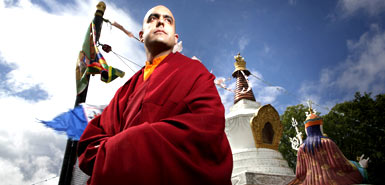 Are you stressed? Of course you are. A quarter of sick days can be attributed
to work-related stress. Seven of the ten leading causes of death in
developed nations are directly or indirectly stress-related.
Are you stressed? Of course you are. A quarter of sick days can be attributed
to work-related stress. Seven of the ten leading causes of death in
developed nations are directly or indirectly stress-related.
Last week we learnt that Silvio Berlusconi is beginning a three-week summer holiday with medical treatment to relieve stress and that a Ministry of Defence press officer is claiming that being forced to tell lies about the war in Iraq has left him with a stress-related condition. I bet even the Dalai Lama is stressed.
Which brings me to Gelong Thubten, who was an ordinary twentysomething, Oxford-educated North Londoner until he took 12 months out to study Buddhism and resurfaced as an ordained monk. The Times interviewed him on his emergence from a four-year retreat at the Samye Ling Monastery in Dumfriesshire, producing a piece containing several fascinating revelations, not least the news that he “plans to return to the work he did beforehand: counselling businesses ... on stress management”.
The line tapped into a pet hate of mine about personal development courses and business training courses in general: too often they are run by people who have dropped out of business, failed in business or have no experience of business at all. I mean, it would be interesting to hear how the head of HBOS handles stress.
But what practical advice can a monk who has never worked in business, who has spent the past four years in a small room, containing a shrine, a meditation box and a trunk for his meagre personal possessions, teach someone struggling to run, say, a crockery business in Norwich during the most severe economic downturn in living memory?
To find out, I arranged to meet him in a café in Piccadilly the other day, fully expecting to be afflicted with the hoary old advice you get in conventional stress management books and, sure enough, on my prompting, he talked about the importance of “taking exercise” (“during the retreat we did prostrations, a form of yoga where you bow in front of a shrine”), the tyrannical effect of technology (“the thing I’ve most noticed since coming back is the hold that technology has on people”) and the importance of avoiding gossip (“in Buddhism, we train in speaking positively”).
But it was when I got him on to the subject of diet (“lots of sugar, caffeine and alcohol increase stress”), that the 37-year-old monk noticed he was drinking coffee, laughed and admitted that such tips weren’t the kind of things he proffered when he visited organisations such as Ernst and Young and The Institute of Chartered Accountants.
“Look,” he breathed, “I do things that are probably bad for stress, according to conventional wisdom. I drink coffee, take on too many things at once, answer e-mails as soon as I get them instead of tackling them at specific times of the day, but that’s not what my training is about. I don’t actually believe in the phrase ‘stress management’. It implies finding props to manage it. I’m more interested in undoing the stress from within.” Right. And how do you do that? “Meditation.” Meditation? “Meditation . . .” He adjusted his red robes. “... is key.”
I inhaled and exhaled deeply and questioned the practicality of your average professional breaking off from a stressful PowerPoint presentation or appraisal to chant. “Ah well,” he responded. “People think meditation is about sitting in the lotus position, but it’s not. You can meditate while you’re driving, checking e-mails. For most of us, our mind is always flipping around between past and future and meditation basically involves bringing your focus to the present, to the here and now. You can just go to the loo and meditate while you’re washing your hands.” Which is good practice in relation to swine flu, if nothing else.
“Well,” he continued, ignoring the weak joke. “For me the difference between someone who meditates and someone who doesn’t is that the former is entirely dependent on what happens around them for their happiness and pain, whereas the latter isn’t.”
We continued discussing the subject for about an hour before parting and, having spent a week meditating upon what was said, I’m surprised to say that I think Thubten is worth listening to. Why? Well, first, it strikes me that I can hardly complain about someone who has no experience of business pontificating about business, given I have ... no experience of business and spend a significant portion of my life pontificating about business.
Second, whereas business training consultants normally try to complicate and mystify to justify ludicrous fees, Thubten’s message is simple, which is refreshing and makes me suspect he is sincere. Third, he doesn’t charge ludicrous fees — he doesn’t take personal payment for visiting companies at all, in fact, any money goes to his monastery, a registered charity.
And finally, I talked to one of his clients, a high-powered private equity manager, about the value of meditation and the way she explained its appeal is that it helps to keep the events of the working day in perspective. And that’s what stress is, isn’t it? It’s the momentary failure to realise that nothing really matters that much.





